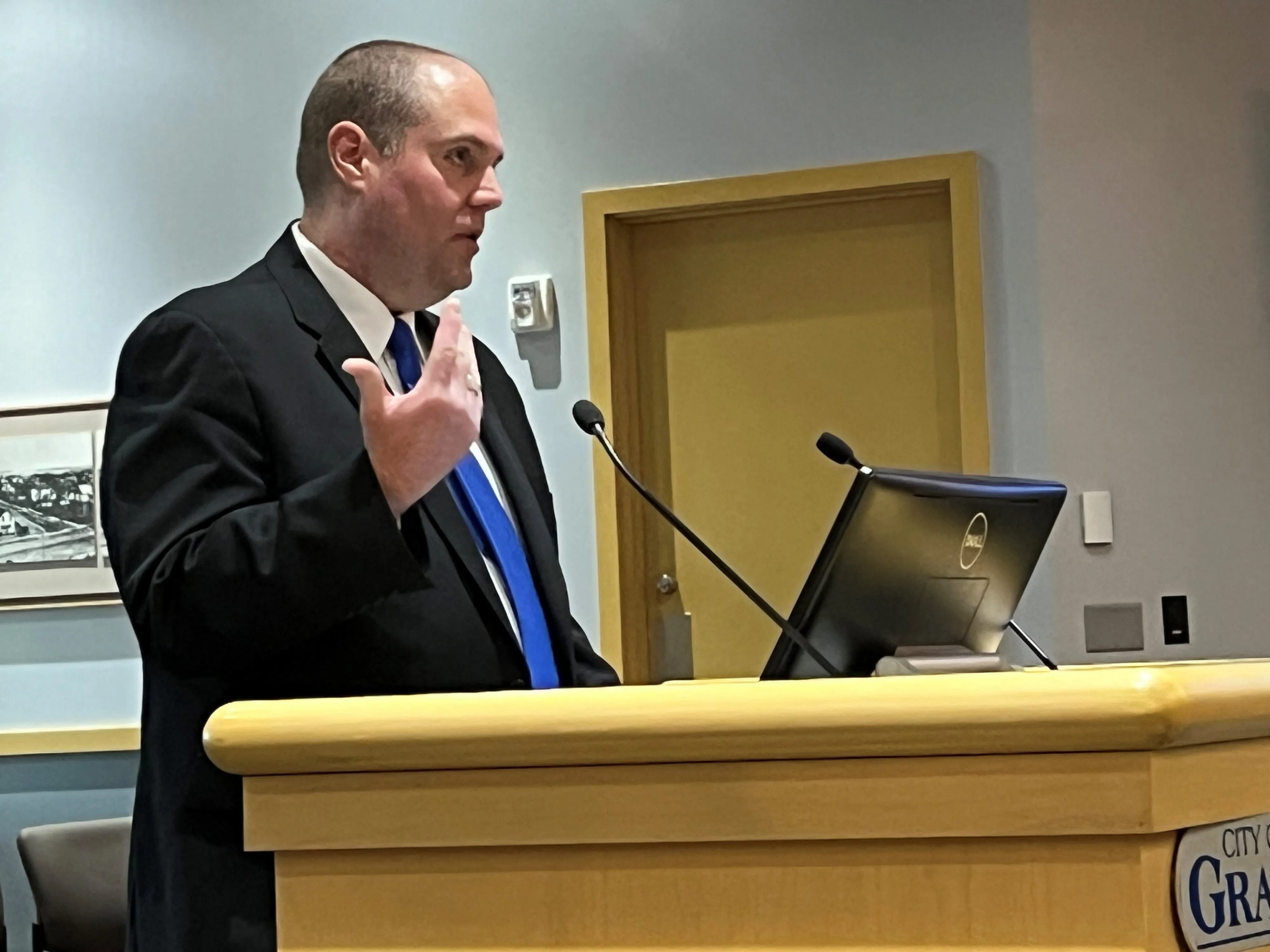
Matthew Gleason is the city of Grand Island’s new finance director/city treasurer, (Carol Bryant, Central Nebraska Today)
GRAND ISLAND – The Grand Island City Council hired Matthew Gleason, who currently works at Peru State College, as its finance director/city treasurer.
The City Council approved hiring Gleason by a 9-0-1 vote Tuesday, April 23, with Council Member Mitch Nickerson abstaining from voting.
Gleason will be in charge of the daily operations of the city’s finances under the supervision of Chief Financial Officer/Assistant City Administrator Patrick Brown, Mayor Roger Steele wrote in a memo to City Council.
Gleason has served as a business instructor and Director of Accounting and Audit Services for Peru State College since 2014.
“His responsibilities included teaching various business classes, managing daily operations of the accounting office, and preparing financial statements,” Steele wrote.
Gleason earned a bachelor’s degree in business administration with an accounting major and a master’s degree in business administration with an accounting concentration from Pittsburg State University.
Gleason’s starting annual salary will be $129,774 and will start working on May 6 for the city.
In another matter, the Grand Island Area Economic Development Corporation was awarded $1,256,715 from the Nebraska Department of Economic Development’s Rural Workforce Housing Fund program (RWHF). The Economic Development Corporation plans to use the grant funds in its revolving loan fund program called Build Grand Island, in the same way as two prior RWHF grant awards it received. Matching funds are required for the grant. The Economic Development Corp. requested $314,179 from the city’s Economic Development Program (LB840) for the grant.
According to a memo from City Administrator Laura McAloon, with the matching fund grant, Build Grand Island will have a combined revolving loan fund total of $5,245,957. The funds assist area housing developers to revitalize, rehabilitate, and construct workforce housing within Grand Island and its 2-mile planning jurisdiction.
Eligible projects include:
*New owner housing costing no more than $325,000.
*New rental housing units costing no more than $250,000.
*Owner-occupied or rental housing units for which the cost to rehabilitate exceeds 50 percent of a unit’s assessed value.
*Upper-story housing.
*Rehabilitation of an existing building into housing.
The City Council approved providing the matching funds by a 9-0-1 vote, with Council Member Jack Sheard abstaining.
The next item involved approximately 700 acres of land north of Schimmer Drive east of Locust Street and north of the Platte River. The Hartman family, which owns the property, and the Platte River Whooping Crane Trust want to place a conservation easement on the southern most portion of this property adjacent to the Platte River.
Regional Planning Commission staff is recommending that all of the property south of Schimmer Drive that is not located immediately adjacent to Locust Street be changed to Transitional Agriculture zoning. This type of zoning is for property that is unlikely to see any urbanized development, and the property is preserved for agricultural uses. Part of this property is proposed for a conservation easement. The property does provide habitat for sandhill cranes, whooping cranes, and other migratory birds. City Council voted 10-0 to approve having the property zoned as Transitional Agriculture.
Tom Hartman of Grand Island said, “We don’t want this area developed. This would be a great opportunity to have some green space.”
The Hartman Family and the Platte River Whooping Crane Trust submitted a proposed conservation easement to allow a development corridor along Locust Street. A conservation easement was proposed for approximately 292 acres of property located east of Locust Street and the Platte Generating Station north of the Platte River along Wildwood Drive.
The Crane Trust is acquiring this easement, according to Regional Planning Director Chad Nabity, because the land serves as critical pre-roost staging habitat for sandhill cranes and whooping cranes. Protecting the land is important to preserving high quality crane roost habitat as well as habitat for other migratory birds. The easement is a voluntary agreement between the property owner and the Crane Trust. The City Council voted 10-0 to approve the easement.













